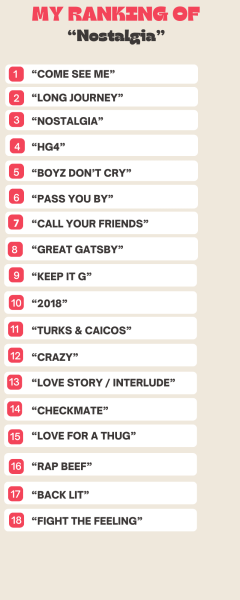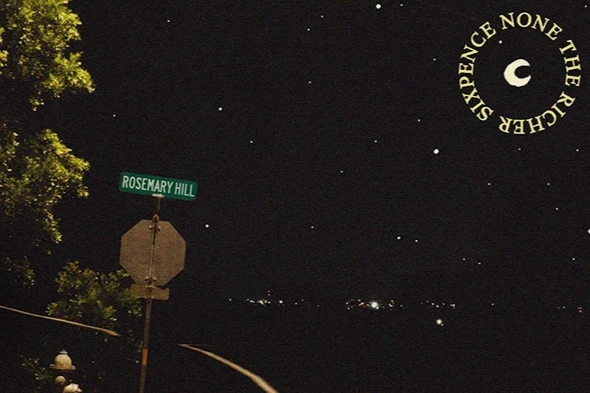Florida rapper Rodarius Marcell Green ÔÇö known professionally as Rod Wave ÔÇö has become one the worldÔÇÖs biggest music artists yet. Green defined the new genre of soul trap, a subgenre of hip hop that incorporates soulful melodies with contemporary beats. On Sept. 15, he dropped his new album ÔÇťNostalgia.ÔÇŁ In an interview with Apple MusicÔÇÖs ÔÇťRap Life RadioÔÇŁ with Nick and Eddie, Green explained that the album was named as such because no matter what his fame brought him, he never forgot where he came from.
Addressing the lyrics 
The first track on the album is its eponymous song, ÔÇťNostalgia.ÔÇŁ In the song, Green says, ÔÇťSo I’m focused more than ever, been grindin’ like we ain’t winnin’. I was stuck inside that bottom with problems, gettin’ evicted. Now it’s back-to-back tours two summers for 60 million.ÔÇŁ After GreenÔÇÖs parents separated and his father went to jail while he was in elementary school, his life changed drastically. He and his mother inched closer to poverty, and he turned to the streets. With this specific verse, Green addresses his detachment from the ÔÇťtrenchesÔÇŁ ÔÇö a neighborhood surrounded by drugs, robberies and illegal possessions of firearms, exploring the challenges of keeping up with the platform he built for himself as well as success and fame.┬á
The lyrics are emotionally impactful because so many people around the world relate to these impoverished standards. But the lyrics also motivate people to have the drive to work with what they have and not worry about what they donÔÇÖt have. Not only were the lyrics inspiring, but having a well-known artist like Rod Wave vocalize them so sanguinely is greatly influencing because of how he presents himself and his music to his audience.┬á
The second track on the album, ÔÇťLong Journey,ÔÇŁ says ÔÇťAnd I know the sayin’, more money, more problems, nah. More money, more people with they money problems lookin’ for you to solve ’em.ÔÇŁ At some point in time, being the wealthy person in a family brings chaos. Everyone wants a little taste of what the ÔÇťrich lifeÔÇŁ feels like and, typically, people only seem to come to you when at times they need something. Green also mentions this situation initially in his song ÔÇťCall Your Friends,ÔÇŁ because money creates distance in relationships.┬á
Green currently has a net worth of $9 million. However, the message isnÔÇÖt just referring to the wealthiest of people, but in general. The majority of people make a living off the standard job and can be perceived as a factor to provide for non-immediate family. But even so, money, fame and a platform means nothing if mentally and spiritually you feel no connection with anyone because youÔÇÖve only been valued based off what you can bring. The lyrics were truly moving because even without it being vocalized by a popular music artist, itÔÇÖs something that anyone could experience one point in their life.┬á
The sixth song, ÔÇťCrazy,ÔÇŁ describes the journey to success and misconceptions people have about it. Green sings, ÔÇťAin’t it fun? Ain’t it fun? Livin’ in the real world. What work for you might notÔÇůworkÔÇůfor me. I droppedÔÇůeverything, went and chased my dream.ÔÇŁ The lyrics reflect the idea that success can come in many different forms and what works for one might not work for the next. Greens emphasizes pursuing your dreams regardless of what others might think because not taking a risk is the biggest risk of all. It hits on a tenor to never shut down someone because you yourself couldnÔÇÖt accomplish something important to you or something they could.┬á

As Green points out, itÔÇÖs sometimes easier to be motivated cynically. You take a different approach on your goals and who you talk to about them. Ultimately, the lack of faith others have on your uprise typically makes a stronger mindset. It makes a person go from ÔÇťI think I can do itÔÇŁ to ÔÇťyou said I couldnÔÇÖt do it, so I went and did it.ÔÇŁ┬á┬á
What do the songs mean? 
The third track on the album, ÔÇťCall Your Friends,ÔÇŁ represents GreenÔÇÖs vulnerability towards his friends and family. He vocalizes the importance of checking up on significant people in your life and not just times when you need favors. Oftentimes, we forget that money does not equate to the value of those around us, but rather know that everyone goes through things even with the brightest smiles and a fortune of money in their wallets. And at some point, we start to degrade ourselves and need someone to be there just for the sake of our well being. Showing an upbeat and soft side of the album, ÔÇťCall Your FriendsÔÇŁ is by far one of the most attention-catching songs on ÔÇťNostalgia.ÔÇŁ┬á
The 12th track ÔÇťPass You ByÔÇŁ conveys a message of encouragement to follow your dreams. In this song, Green reflects on his sacrifices and what it took to get where he is now. In this case, he influences his listeners to never let time pass by without accomplishing something and to never dwell on hard times. In the outro, he reinforces the importance of taking risks and moving forward because thereÔÇÖs only so much time in life. Furthermore, it encourages listeners to be resilient and live life to the fullest because nothing is guaranteed, and tomorrow isnÔÇÖt always promised.┬á
The 13th track, ÔÇťGreat Gatsby,ÔÇŁ is a song about emotionally up and down relationships. In this case, Green expresses his painful separation for his woman who he mentally can not be with, mirroring ÔÇťThe Great Gatsby,ÔÇŁ the 1925 F. Scott Fitzgerald novel about self-made millionaire Jay Gatsby and his love for Daisy Buchanan, which did not work out no matter what he did to impress her. Additionally, this song conveys a message about disloyalty and betrayal but doesnÔÇÖt undermine the sentiment of wanting to make love work. Love is hard: itÔÇÖs a make or break for so many relationships. It can break a great connection between a couple, forcing them to become strangers in the end. This song is definitely worth listening to because itÔÇÖs the perfect combination of GreenÔÇÖs process of learning and lessons he wishes to share.┬á
The 16th track, ÔÇťRap Beef,ÔÇŁ addresses conflicts regarding other artists. From what the audience knows, Green stays out of the drama in the music industry. He states this in the interlude of the song by saying, ÔÇťI don’t want no beef period, I don’t want no jail time. I don’t want none of that, I’m tryna get this, get these M’s and live with these M’s like these white folks, man, you know what I’m sayin’?ÔÇŁ The song indicates that regardless of who is more successful amongst the rapping industry, bringing attention to your platform by degrading another artist proves nothing ÔÇö especially if youÔÇÖre a step ahead. This song has more hopeful instrumentals to bring light to what Green is trying to promote. With that, it proposes a positive outlet to not only the album, but GreenÔÇÖs platform in general.┬á
Rating
Overall, Green did an excellent job on the album ÔÇťNostalgia,ÔÇŁ incorporating the importance of remembering where you came from, regardless of the money or fame you obtained over the course of your success. Hard work pays off in the end and hard times never last forever. Each song brought the listener a different perspective of how life can either break you or make you. And although everyoneÔÇÖs story is different, we all experience challenges and struggles because no lifestyle is perfect.┬á
For Gen Z, music is often a shared interest; it gives people that motivation to get up and chase your dreams. ThatÔÇÖs exactly what this album expressed. That said, get your Rod Wave ÔÇťNostalgiaÔÇŁ tour tickets today.┬á
ÔÇťNostalgiaÔÇŁ 10/10





![There are more than 20 open cardio machines at Crunch Fitness. I enjoyed the spacious environment at Crunch, a sentiment that was shared by sophomore Sanjana Daggubati. ÔÇť[Going to] Crunch Fitness was the right decision because [it] feels more professional. CrunchÔÇÖs workers are laid back, but not to the point where they don't care,ÔÇŁ Daggubati said.](https://pwestpathfinder.com/wp-content/uploads/2025/09/IMG_5242-1-1200x900.jpg)

![Various empty Kit Kat wrappers crowd the desk, surrounded by scoring sheets. While production of Kit Kat flavors in the U.S. is limited, Nestl├ę, the owner of Kit Kat, manufactures hundreds of unique flavors in Japan, including the flavors ocean salt and passion fruit. ÔÇťI thought there [were] some interesting flavors, and a lot of them were really unexpected,ÔÇŁ senior Elle Levesque said.](https://pwestpathfinder.com/wp-content/uploads/2025/09/image-2.png)


![PantoneÔÇÖs selection of the 2025 Color of the Year is revealed: Mocha Mousse. Ceramics teacher Ashley Drissell enjoys this yearÔÇÖs selection. ÔÇťMaybe itÔÇÖs the name but [Mocha Mousse] reminds me of chocolate and coffee. It makes me hungry. ItÔÇÖs very rich and decadent,ÔÇŁ Drissell said.](https://pwestpathfinder.com/wp-content/uploads/2025/02/DSC_0015-1200x800.jpg)



Mama jackson • Mar 14, 2024 at 8:03 am
He’s the best thing that cud of ever happened